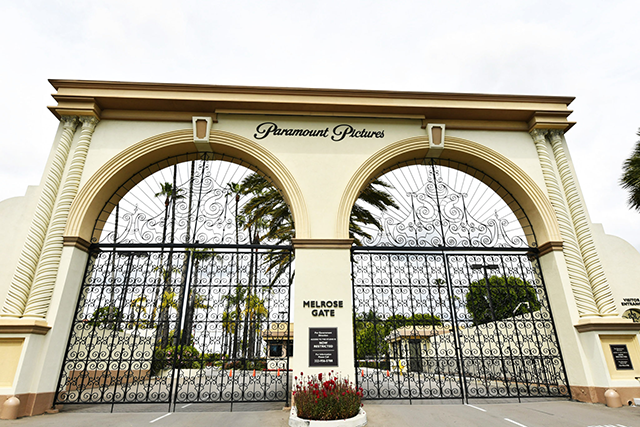You are here
Reinvent the reel: Hollywood mulls new measures to restart shooting
By AFP - Apr 29,2020 - Last updated at Apr 29,2020

Paramount Studios halt film and TV production amid the coronavirus crisis on April 8 in Los Angeles, California (AFP photo by Amy Sussman)
LOS ANGELES — Movie moguls, directors and lawyers are searching for radical solutions to reopen Hollywood as soundstages gather dust and studio profits slide weeks after cameras stopped rolling due to coronavirus.
The film industry has been on lockdown in California since mid-March following strict stay-at-home orders, with movie and television shoots particularly exposed to the pandemic because of the large casts and crews required.
But even as politicians mull a gradual easing of restrictions, insiders say Tinseltown's sky-high costs — and liabilities — mean filmmaking could look very different to what came before, and be many months away.
"It's impossible to make a 'Star Wars' or a Marvel movie tomorrow morning," said Nicolas Chartier, Oscar-winning producer of "The Hurt Locker."
"Logically, there's too much liability and there's too much fear," agreed fellow producer Stephen Nemeth ("Fear and Loathing in Las Vegas.")
"I can't see a movie like 'Dune' getting produced now. I can't see another epic film like 'Mad Max' — these films are 250 crew members and 250 extras. We just can't control it."
Though California has been praised for its pandemic response, the movie industry heartland has still recorded 45,000 cases, disproportionately centred around Los Angeles.
As such, insurance companies refuse to cover future production halts caused by on-set coronavirus outbreaks — delays that could cost millions on blockbuster projects.
"Coronavirus waivers" signed by employees have been touted as a way to protect studios from lawsuits, but are unproven particularly where A-list stars are involved.
Replacing crowd scenes with computerized background actors is another option being explored, but "would cost a fortune," said Chartier.
"In my opinion, the big movies as we knew them — to the extent that they're ever going to be back as we knew them — won't be until there is an actual vaccine," added Nemeth.
- 'Moral dilemma' -
One possible interim solution is temperature, virus or antibody tests for those entering sets.
On-set social distancing is being trialled in Sweden and Denmark, where production has resumed on sterilised soundstages, and studios are discouraged from hiring over-70s or those with health conditions.
Steven Soderbergh, director of prescient 2011 pandemic thriller "Contagion," is leading a taskforce to explore similar options in Hollywood.
But those restrictions are far from practical on crowded film sets, and could lead to discrimination and other dangers, warned producers Jean de Meuron and Elena Bawiec.
"The crew that are most vulnerable is the 'below-the-line' crew — the gaffers, the grips, the electric, the camera," said de Meuron.
"You can't put six-feet distance... the focus puller is right next to the camera operator, they're within a couple of inches from one another."
"How are you going to change that?"
Crews of workers "who have tested positive for antibodies and bring certificates" could become a reality, suggested Bawiec.
"But are there going to be people who are going to go and get themselves infected on purpose, so that they could have the virus and then be immune?
"It's a moral dilemma."
'For peanuts'
Filmmakers are being forced to experiment with new locations, techniques and even genres which lend themselves to a locked-down world.
Most involve dramatic downsizes. Nemeth is planning to shoot a movie at his home in the Hollywood Hills, where he can house a skeleton cast and crew throughout a brief shoot.
"We could have hyper-regional, hyper-close productions... it would work in Silver Lake, in Malibu, in Hollywood Hills," he said, referring to local movie hotspots.
"I'm doing it and I promise you I'm not the only one."
Chartier intends to make a film "for peanuts" shot via Zoom or Skype in which four couples discuss a murder.
"The actors will film themselves at home, with their own clothes and no makeup," he explained.
Hollywood lore is filled with heroic filmmakers who overcame huge obstacles to shoot great movies, but Chartier is not getting carried away.
"Either it will be a good script and the story will be good and it will be interesting, or we will get bored after 15 minutes and... too bad!"
By Andrew Marszal
Related Articles
CANNES, France — Tom Cruise's "Mission: Impossible - The Final Reckoning" powers into the Cannes film festival for its premiere Wednesday on
AMMAN — The lunar landscape of Jordan's Wadi Rum valley gets a starring role this week when the next and final episode of the Star Wars saga
LAS VEGAS — Hollywood studio Universal Pictures on Wednesday teased new movies from Steven Spielberg and Christopher Nolan, while showcasing













